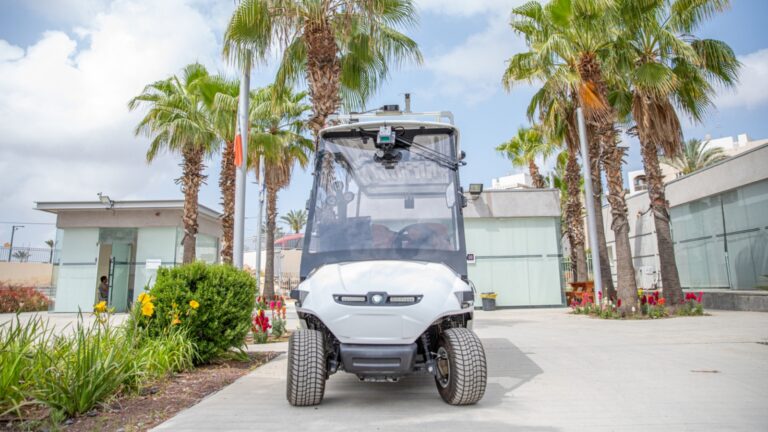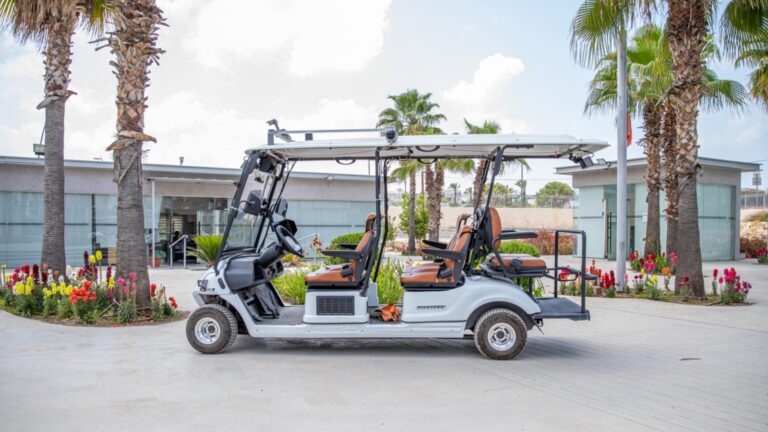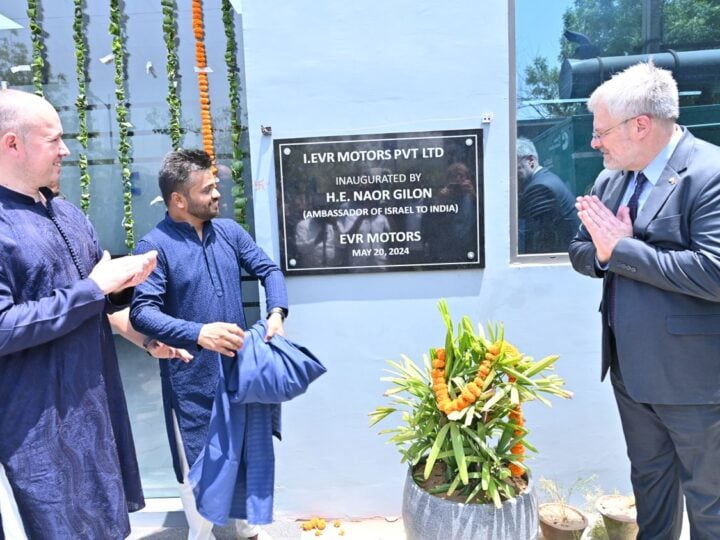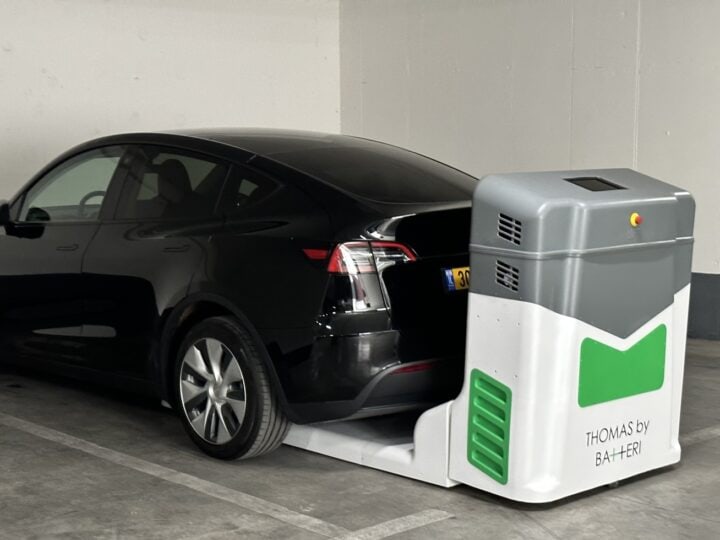Fully autonomous vehicles won’t arrive for at least 10 to 15 years, despite the rosy forecasts of enthusiastic pundits and industry cheerleaders like Tesla CEO Elon Musk.
But that doesn’t mean autonomy today is impossible.
It just needs to be limited to locations — such as university or hospital campuses, holiday resorts, senior villages and industrial plants — and move at very low speeds of 15 miles per hour max.
If that sounds like the perfect use case for an electric golf cart, you’re on the same page as Avinoam Barak, CEO of Carteav, an Israeli startup aiming to bring “golf carts 2.0” into the autonomous age.
These high-tech conveyances aren’t called golf carts, but rather LSV (low-speed vehicle) or NEV (neighborhood electric vehicle).
Imagine you need to get from one end of campus to the other, or from the resort pool to your room higher up in the hills.
You open an app on your phone, tap a button and within minutes (or immediately if you scheduled a vehicle to arrive at a specific time), your driverless LSV arrives based on your GPS location.
Simple as possible
Barak says making the app as simple as possible was key.
“You don’t need to tell the cart where you want to go in advance,” he notes. “You just tell it to come.”
With services like Uber, drivers choose whether to pick you up based on where they want to go. But Carteav’s carts have no drivers. Hence no conflict of interest.

In a managed area configuration, there are a limited number of destinations. Carteav programs those in so the user can just select a restaurant, park or community center from a menu, rather than typing in the destination and hoping the app can find it, spelling errors and all.
To get started, a Carteav customer will drive the LSV around its property. Mapping the entire area takes less than 24 hours, Barak says.
You’ve reached your destination
When you get to your destination, you can tell the LSV to wait to make another trip (you can choose up to three destinations on a single order) or “release” it to pick up its next passenger – or to head off for a recharge.
Unlike autonomous cars, Carteav’s LSVs are restricted to low speeds, reducing the risk of injury in case of a collision.
And since the carts won’t travel on public roads, Carteav does not have to wait for governmental regulations for self-driving cars.
The company’s mapping software can include data such as whether a left turn is possible or whether speed should be reduced on a narrow bridge.
That takes some of the burden off the autonomous software built into the cart and adds an important element of redundancy in case communication between the cart and the cloud gets interrupted.
A free service?
How much will those carts cost? Barak estimates a subscription fee of $1,000 per cart per month.
But because customers will save money by not employing a driver, Barak expects that most will include the autonomous LSVs in the package of services already purchased by users such as resort guests or university students.
Residents of senior communities, for example, “are already paying something like $5,000 a month that covers healthcare, food, activities. Now they’ll get this service, too.”
Carteav is running a paid pilot at the Ahuzat Poleg retirement village near Netanya. Here’s a video of how it works.
You’ll notice that this LSV has a “safety driver” – someone behind the wheel who can spring to action if there’s a problem.
Barak says that safety drivers will be used “in the first three months of deployment” only until customers get comfortable with the autonomous service.
Other customers could use the LSVs to increase revenue, such as a large park that already rents out golf carts at entrance points. Autonomous carts could be summoned by hikers anywhere within the site, on demand.
Commercialization by end of 2023
Carteav (the name is a portmanteau combining “cart” and “AV” for autonomous vehicle) plans to have its first self-driving golf carts running commercially by the end of 2023 or early 2024, Barak says.
The core LSVs are made by electric golf cart makers such as Turkey’s Pilot Car, with whom Carteav will run a pilot in 2023.
Carteav adds a layer of sensors, cameras and cables to control steering, brakes and acceleration and to communicate with Carteav’s mobile app that tells the carts where to go and when to arrive.
Carteav’s software “talks” to passengers: “I’m starting to move now,” “I’m taking a right turn” or “Please take your belongings when you leave the cart.”

Car-free zones
While Carteav is focusing on managed areas to start, Barak is not ruling out public transportation in urban areas. Several cities around the world have adopted “car-free zones,” he points out.
Barcelona has its “super blocks” without cars. Tel Aviv has a plan to close crowded Allenby Street to private vehicles. Tempe, Arizona, is developing a car-free community called Culdesac.
“But you’ll still need transportation in those areas, if you have young kids or need to carry luggage,” Barak points out. Scooters and e-bikes are not so useful in those cases.
Carteav has been running paid pilots in Israel, with plans to add trials in Arizona and Florida in 2023.
Another possibility down the road: ferrying passengers autonomously from their homes to a metro or subway station.
Barak is eyeing such an approach for the future metro stations in Rishon LeZion, which is where Carteav’s headquarters is based.
Disruptive technology
The 20-person company has raised $6.5 million and counts Zohar Zisapel as both chairman and lead investor.
Zisapel, who founded RAD Data Communication and subsequently has backed some of Israel’s most intriguing auto-tech startups — including Argus, Hailo and Innoviz — helped conceive of the idea for Carteav. Zisapel and Barak previously worked together at RADVISION, where Carteav’s CTO, Eli Doron, was a founder.
“Carteav’s ability to accelerate the technology that powers these vehicles positions the company to fully disrupt the LSV sector,” Zisapel said.
The one area that Carteav has not been able to automate yet is plugging into a charge spot.
“There will be a person there to do that,” Barak says, adding that this attendant could also clean the carts and make sure passengers don’t leave personal items inside.
Wireless charging may eliminate the need for a human attendant but, Barak says, “we’re not there yet.”
Carteav will debut its LSV at the annual CES (Consumer Electronics Show) in Las Vegas in January, inside the Israeli pavilion.
While using Carteav’s LSVs to transport attendees around the cavernous conference space is not yet on the agenda, Barak is sure that the Carteav “solution can help in big events.”
We’ll look forward to taking a ride with Carteav at the 2024 edition of CES.
For more on Carteav, click here.

















